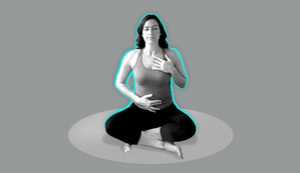(CNN)Do you find yourself dozing off at your desk, even after what you thought was a good night’s rest? Then you probably have the same question as so many others: How much do I need to sleep?The answer of how many hours you need is not so straightforward, said Dr. Raj Dasgupta, an assistant professor of clinical medicine in the division of pulmonary, critical care and sleep medicine at the Keck School of Medicine of the University of Southern California.Sleep needs are very individualized, he said, but the general recommendation — the “sweet spot” — is to get seven to nine hours of sleep a night. Recommendations really change as people age, however.

Start your day with breathing exercises for stress relief“Sleep needs vary over the lifespan,” said Christina Chick, a postdoctoral scholar in psychiatry and behavioral sciences at Stanford University.
CDC’s sleep guideline
Adults should get at least seven hours of sleep a night, but 1 in 3 of them don’t, according to the US Centers for Disease Control and Prevention.Poor sleep has been associated with long-term health consequences, such as higher risk of cardiovascular disease, diabetes, obesity and dementia. In the short term, even one day of sleep loss can harm your well-being, according to a recent study. People who get poor sleep might also be predisposed to conditions such as anxiety, depression and bipolar disorder, Dasgupta said.”There are chronic consequences, and there are acute consequences, which is why sleep is more than just saying, ‘The early bird gets the worm,'” he said. “It’s much more than that.”
Sleep for kids and teens
If it feels like babies are sleeping all day, they pretty much are. In the first year of life, babies can sleep 17 to 20 hours a day, Dasgupta said. Infants 4 months to 12 months need their 12 to 16 hours of sleep, including naps, according to Chick.

11 blankets that will actually keep you cool this summer (CNN Underscored)Toddlers, who are between the ages of 1 and 3, should get 11 to 14 hours of sleep, according to Dr. Bhanu Kolla, associate professor of psychiatry and psychology at the Mayo Clinic with a special interest in sleep. Children ages 3 to 5 should sleep for 10 to 13 hours, he added, and from ages 6 to 12, they should sleep nine to 12 hours. For kids up to age 5, these sleep recommendations include naps, Chick said.Teenagers should get eight to 10 hours of sleep, Kolla said. This recommendation has sparked a debate in recent years about start times for school.”As children move toward adolescence, they naturally prefer to go to sleep later and wake up later,” Chick said. “This is why school start times are such an important focus of debate: If you can’t fall asleep until later, but your school start time remains the same, you’re going to get less sleep.”The quantity of sleep is important, but so is the quality of it, Dasgupta added.Getting deeper sleep and hitting the rapid eye movement (REM) stage helps with cognition, memory and productivity throughout the day. REM is the sleep stage where memories are consolidated and stored. It also allows us to dream vividly. People can sometimes get the right quantity of sleep but still feel fatigued, and this might mean they aren’t reaching these sleep stages.

How to stop talking in your sleep“We tend to underestimate the need, especially in teenagers, people going to high school, of how important sleep is,” Dasgupta said.
Sleep for college students and adults
The stereotypical image of the college student usually includes messy hair, undereye bags, and a coffee or energy drink in hand. It doesn’t matter if they stay up all night partying or cramming for an exam — both result in sleep deprivation.”It’s unfortunate, but it’s almost like a rite of passage in a college student to pull the perennial all-nighter even though we know that’s not what you’re supposed to do,” Dasgupta said.He and Kolla concur that seven to nine hours of sleep is best for adults, though Kolla added that older adults may be better at coping with some sleep deprivation. As an exception, young adults may need nine or more hours on a regular basis because their brains are still developing, Chick said, and adults of any age may also need nine or more hours when recovering from an injury, illness or sleep debt.There are also “natural variants,” Kolla said, referring to some people who require more than 10 hours of sleep and others who get less than four and function normally.If you’re wondering whether it matters if you’re an early bird or night owl, Chick said it depends on “whether your lifestyle is compatible” with your preference.RELATED:Are you a night owl or morning lark? One may protect you from depression“If you are a night owl, but your job requires you to be in the office at 7 am, this misalignment is less than ideal for your physical and mental health,” she wrote in an email. “But it would be equally problematic for a morning person who works the night shift.”
How to improve your sleep
Are you not getting enough sleep? Here are a few ways to solve that:1. Stick to a bedtime routine. Try to go to bed and wake up at the same time every day. You can even keep a journal to log these sleep times and how often you wake up at night, Dasgupta said, so you can have an idea of what works for you. You should also make sure your room is dark, cool and comfortable when you go to sleep.
2. Turn off the electronic devices. Do this as early as possible before bed, Chick added, as light exposure can affect your body’s sleep-wake cycle.Sign up for the Sleep, But Better newsletter series. Our seven-part guide has helpful hints to achieve better sleep.”Particularly if you are aiming to fall asleep earlier, it’s important to expose yourself to bright natural light as early as possible in the day, and to limit exposure to light in the hours before bedtime,” she said. “Electronic devices mimic many of the wavelengths in sunlight that cue your body to stay awake.”
3. Try mindfulness techniques. Breathing exercises, meditation and yoga can also support sleep, Chick added. Her recent study showed that mindfulness training helped children sleep over an hour more per night.
4. Set good food and exercise habits. Finally, eating healthy and keeping a daily fitness regimen can support better sleep at night, Dasgupta said.”Always try to be consistent with exercise during the day,” he said. “Exercise relieves stress, it helps build up your drive to sleep at night, so there’s many good things there.”
CNN.
